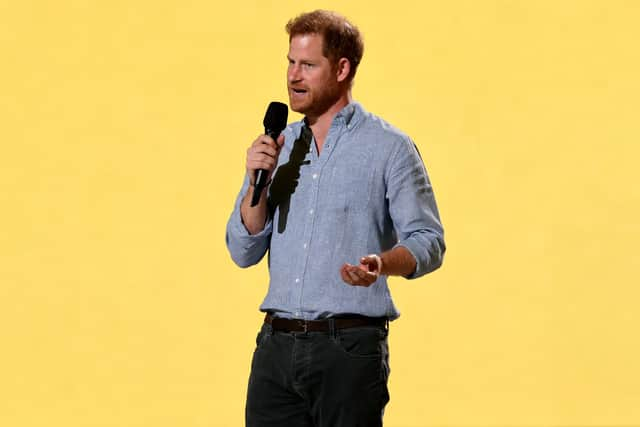What is the First Amendment? US Constitution’s free speech clause explained as Prince Harry calls it 'bonkers'
and live on Freeview channel 276
Prince Harry has sparked outrage in the US after criticising the First Amendment.
The Duke of Sussex called the constitution’s freedom of speech clause “bonkers” while appearing on the Armchair Expert podcast, while also admitting he doesn’t fully understand it.
Advertisement
Hide AdAdvertisement
Hide AdHis comments drew angry reactions from some conservative Americans who said he should leave the country, where he is now living with his wife Meghan Markle, if he doesn’t agree with the constitution.


So, what is the first amendment, what did Harry say about it - and what was the reaction?
Here is everything you need to know.
What is the First Amendment?
The First Amendment gives constitutional protection to freedom of speech.
It was added to the US Constitution in 1791, alongside nine additional amendments which are known as the Bill of Rights as a whole.
Advertisement
Hide AdAdvertisement
Hide AdFreedom of speech isn’t the only freedom protected by the amendment.
It actually contains six separate rights, from free speech, free press and freedom of religion to prohibiting the establishment of a religion by the government, the right to petition the government and the right to peaceably assemble.
The amendment was added not only to afford American citizens the right to speak their minds, but also to ensure government officials can’t restrict speech.
It allows people to criticise authorities without fear of punishment, and in turn to deter attempts by the government to demonstrate authoritarian behaviour.
Advertisement
Hide AdAdvertisement
Hide AdBut, significantly, the amendment doesn’t apply to censorship by private entities, such as Big Tech companies like Twitter and Facebook.
The First Amendment also doesn’t clearly define the parameters of protection, meaning the interpretation of it has been almost entirely developed by the Supreme Court.
The Court, over the years, decided that freedom of speech covers more than just that, and instead protects almost any form of expression.
What did Prince Harry say about it?
The Duke of Sussex was a guest on the Armchair Expert podcast with actor Dax Shepard when he made controversial comments about the constitution.
Advertisement
Hide AdAdvertisement
Hide Ad“I’ve got so much I want to say about the First Amendment as I sort of understand it, but it is bonkers,” he said.
“I don’t want to start going down the First Amendment route because that’s a huge subject and one which I don’t understand because I’ve only been here a short time, but you can find a loophole in anything.
The duke added: “You can capitalise or exploit what’s not said rather than uphold what is said.”
What was the reaction to his comments?
Conservative Americans hit back at Harry after his comments were aired.
Advertisement
Hide AdAdvertisement
Hide AdFox News TV presenter Laura Ingraham suggested the duke should leave America if he did not agree with the amendment when she tweeted: “Don’t let the door knob hit you, Windsor.”
Meanwhile, Texas congressman and former Navy SEAL Dan Crenshaw wrote: "Well I just doubled the size of my Independence Day party."
And former UKIP leader Nigel Farage chimed in on the argument from the UK, writing to followers: “For Prince Harry to condemn the USA’s First Amendment shows he has lost the plot. Soon he will not be wanted on either side of the pond.”
Other social media users said the US battled Britain in the American Revolutionary War to win the rights included in the constitution.
Some also speculated that Harry had made a mistake and had intended to discuss the Second Amendment on the podcast, which is the right to bear arms.
